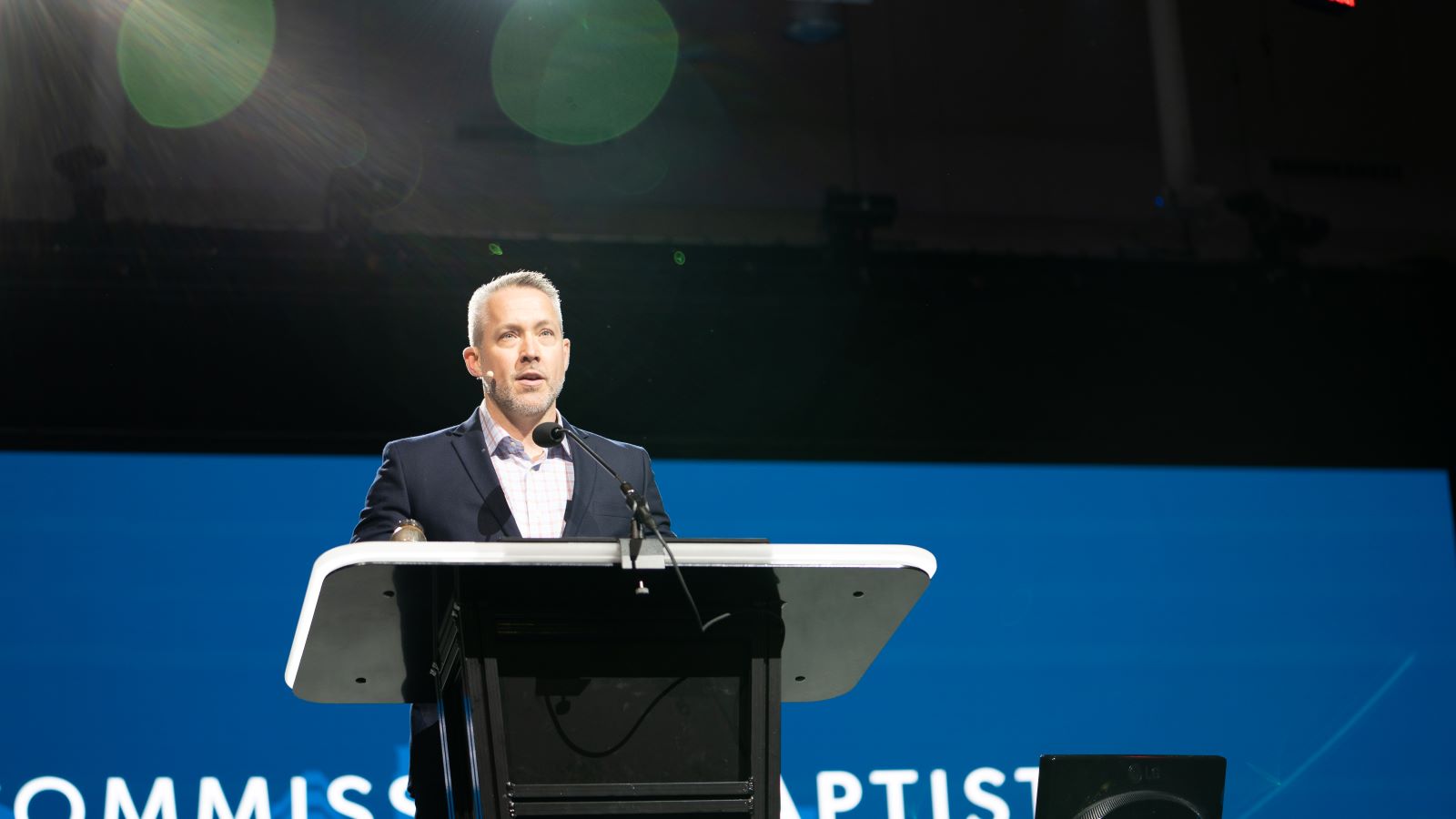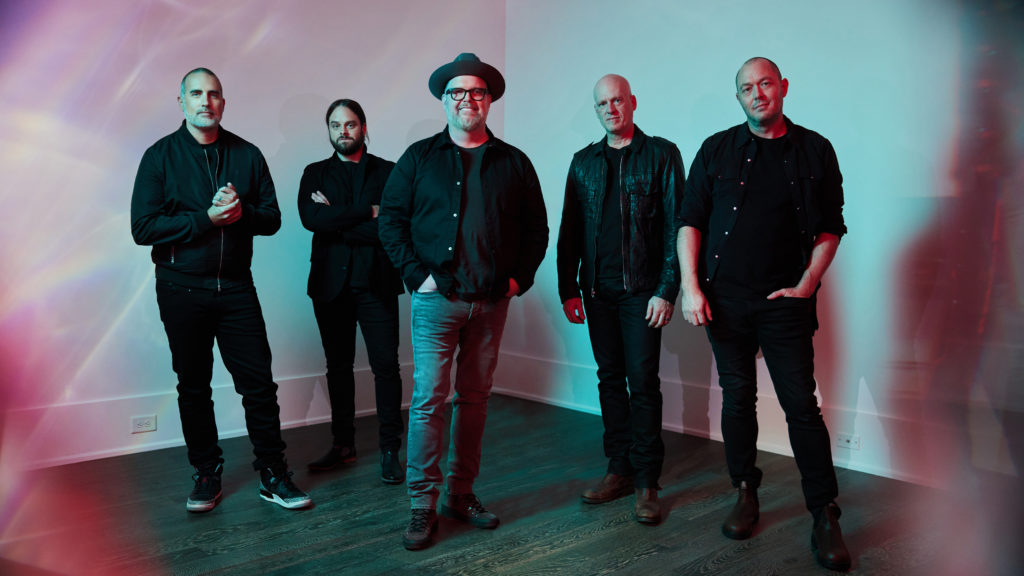J.D. Greear, president of the Southern Baptist Convention, told messengers he wanted to put his cards on the table “right up front.”
“I believe we are at a defining moment in our convention — a crossroads,” he said during his address to the convention Tuesday morning (June 15). “If I may be so bold, it might be the most important crossroads in our generation.”
Greear said the defining moment of the previous generation was the Conservative Resurgence in the 1980s and 1990s, when “God in His faithfulness” raised up a generation of courageous men and women “who called us to hold true” to the authority and sufficiency of Scripture when some, including many seminary professors — were departing from it.
God used their courage “to save our future,” Greear said.
And now, “our defining moment is about whether or not we will let the gospel that our forefathers preserved for us define the identity and mission of our convention,” he said.
‘What holds us together?’
In short, Greear asked messengers who the SBC is and what holds it together.
“Is the Baptist Faith & Message 2000 still the basis for our unity? Is the Great Commission a rallying point? Why do we exist? Why do we come together? Are we primarily a cultural and political affinity group,” Greear asked, “or is our primary calling as a gospel witness for all peoples and all places at all times?”
He said Jesus warned that there is more than one way to lose the gospel — liberalism may be a very real one, but the “leaven of the Pharisees” is another.
“I want to make clear, please hear me, I am not saying that anyone who disagrees with me on something is a Pharisee,” Greear said. “No, for sure, I see some of these qualities present in me also.”
The danger is for Baptists to create a hedge around the law like the Pharisees, confusing tradition with God’s command. This type of leaven can grow in the soil of orthodoxy, he said.
“What does that look like today? It happens when we take a gospel nonessential like a cultural or a stylistic preference, or our application of wisdom in an area where the Bible does not give a direct command … and we give it the same weight,” Greear said.
That can look like insisting on accountability in our leadership while allowing gossip and slander to go unchecked in ourselves, he said. It can also look like an institution creating unnecessary obstacles for victims of sexual abuse to seek justice by hiding behind legal smoke screens or non-disclosure agreements.
“I can assure you it happens when we care more about our reputation than the victims’ safety or defer to protection of the institution rather than the protection of the vulnerable for whom Jesus died,” Greear said.
Phariseeism today can also look like “an SBC that expends more time decrying things like Critical Race Theory (Critical Race Theory) than lamenting the years of racial discrimination and bigotry,” he said.
“Let me state this clearly and for the record,” he said. “For something as important as to what justice in society looks like, we need robust, careful, Bibles-open, on-our-knees discussions about it.”
Justice is a major theme in the Bible, so of course Satan is going to use counterfeits of it, Greear said.
“The vast majority of Southern Baptists and all of your convention’s leaders both black and white recognize that CRT is an ideology that arises out of a worldview at odds with the gospel,” he said.
It’s clear the SBC needs to clarify and strengthen its position on CRT, Greear said. But it’s also important to do that while listening to the counsel of the convention’s leaders of color who say “our denunciations of justice movements fall on deaf ears when we remain silent on the suffering of our neighbors,” he said.
Pledge to fight discrimination
Southern Baptists’ opinion of CRT should be “accompanied by a pledge to fight with them against all forms of discrimination,” Greear said.
He said Matthew 23 shows Jesus’ anger at the Pharisees who were not only off base in their worship — they were also blocking Gentiles’ path to the temple with all of their money-changing tables. They’d forgotten to live out their worship in a way that made the gospel accessible and attractive to outsiders, he explained.
Phariseeism today “might look like us not considering how outsiders perceive our statements and resolutions,” Greear said.
“Let’s be clear, we don’t ever bend the truth to please anybody,” he said. “If we sought to please men, we would not be the servants of Christ.”
But servants of Christ should try to be thinking not just of making opposition clear but also building bridges to nonbelievers, Greear said.
What many nonbelievers have seen this year from Southern Baptists is “character assassinations and baseless accusations,” he said.
Jesus looked at the Pharisees’ hearts and behavior and called them “whitewashed tombs,” Greear said. “They used concern over theological rectitude to cloak divisive self-promoting spirits.”
That sort of behavior doesn’t draw nonbelievers to the gospel, he said. “It makes us smell like death even when our theology is squeaky clean. Why would they be a part when it smells like dead men’s bones?”
Great Commission Baptists
Great Commission Baptists are in large part ready to walk into the future, Greear said, if they would stop tearing each other apart from within.
“The gospel is the north star of our convention. For 175 years it has guided us, exposing our errors and correcting our faults,” he said. If we keep that center, we will become the people He wants us to be.”
Gospel maturity, he said, is “knowing which things should divide us and which ones should not.”
“If we’re going to divide, let it be over something worthy of division,” Greear said. “A convention constantly at war with itself cannot complete the Great Commission.”
It would be “a tragedy to squander the gospel bequeathed in the Conservative Resurgence through unwillingness to be a gospel-above-all and a Great Commission people,” he said.






Share with others: